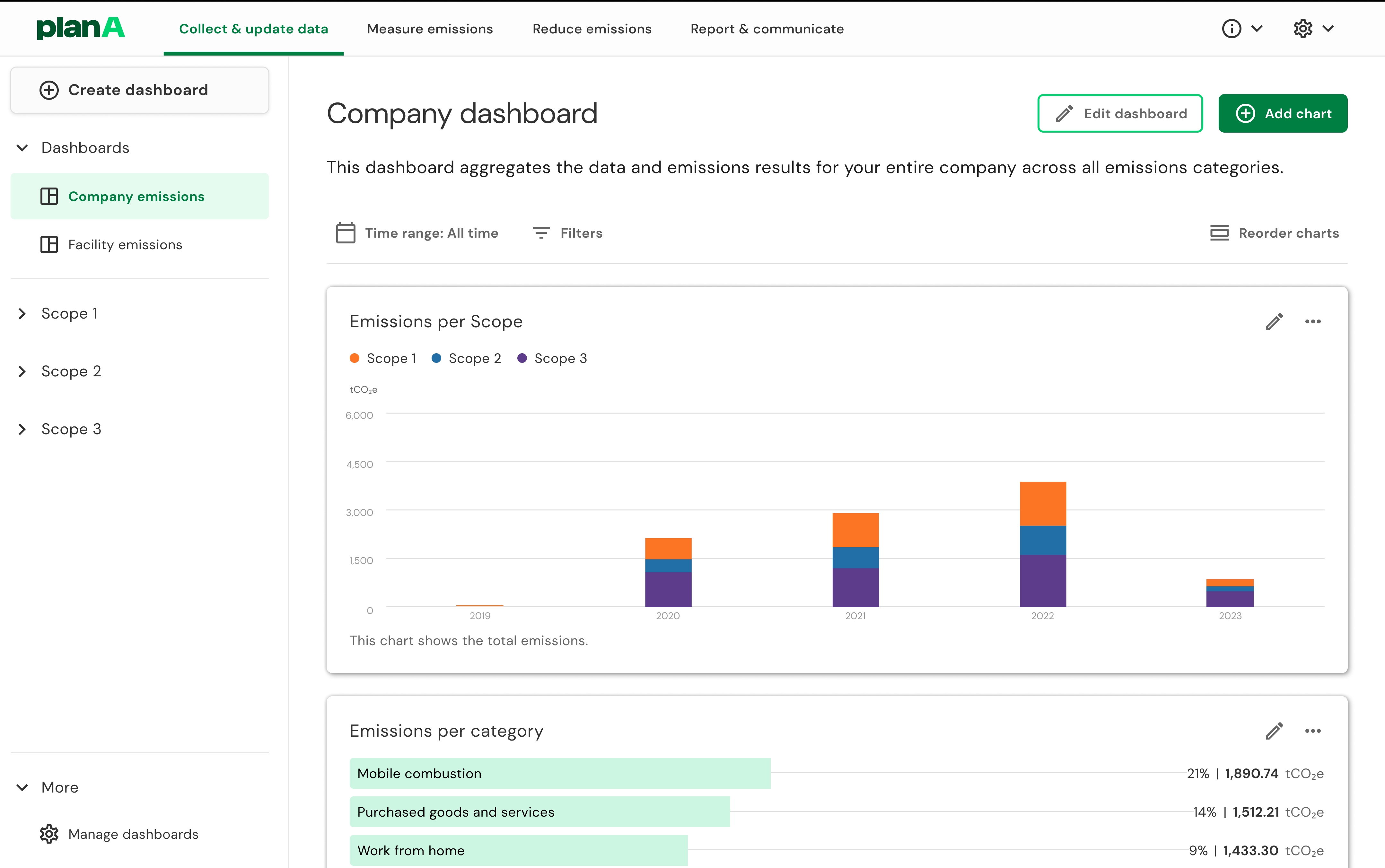Plan A, a carbon accounting and ESG (environmental, social, and governance) reporting platform for corporations, has raised $27 million in a Series A round of funding led by U.S. VC giant Lightspeed Venture partners.
Technically the funding is an extension of a $10 million Series A round it announced nearly two years ago, meaning for all intents and purposes this is the closing of a $37 million Series A round, taking its total raised to $42 million across its six year history. But perhaps more notably, its latest round also includes participation from some major names from the corporate world, including Visa, Deutsche Bank, and BNP Paribas’ VC arm Opera Tech Ventures, among numerous other angel investors.
“The urgency of the climate crisis, combined with the complexity of navigating net-zero journeys for businesses, made it imperative for us to bring onboard top-tier investors now,” Lubomila Jordanova, Plan A founder and CEO, explained to TechCrunch.
Scoping out
Founded out of Berlin in 2017, Plan A (a reference to the ‘no plan B’ climate action mantra) is one of numerous VC-backed startups to emerge out of Europe with the express aim of helping companies measure (and cut) their carbon footprint. The perennial problem, it seems, is that even with the best will in the world, cutting carbon emissions can be difficult unless a company makes a real effort to discover exactly what their emissions are, and where they are in the supply chain.
A survey last year from Boston Consulting Group (BCG) found that 90% of organizations didn’t measure their greenhouse gas emissions “comprehensively.” As usual, so-called “scope 3 emissions” were identified as a major stumbling block, whereby a company fails to address emissions down through its supply chain involving partner businesses. While it’s true that scope 3s are more difficult to measure compared to scope 1 (which refers to emissions directly under a company’s control), there is growing pressure for organizations to address emissions throughout their network.
This is important for a number of reasons, but mainly because many businesses’ carbon footprint is largely made up of scope 3 emissions. For example, a Coca-Cola bottling partner — Coca-Cola European Partners (CCEP) — has previously estimated that 93% of its emissions were scope 3.
Moreover, rather than coming down, global energy-related Co2 emissions are still on the rise, growing 0.9 percent in 2022.
“As the climate crisis is defined in large part by the growth of emissions, one of the most urgent challenges, and the only economically viable choice, is to rapidly reduce the emissions curve, especially for companies,” Jordanova said.
Thus, Plan A has developed a SaaS-based sustainability platform that enables companies to self-manage their net-zero efforts — this includes collecting data, calculating emissions, setting targets, and decarbonization planning. Crucially, it includes mapping emissions data across all scope 1, 2, and 3, and aligning them with global scientific standards and methodologies, including the Greenhouse Gas Protocol and the Science Based Targets Initiative (SBTi).
While the core Plan A product is a web app, customers — which include BMW, Deutsche Bank, KFC, and Visa — can also plug directly into Plan A via API, which is useful for integrating business and emissions data from across myriad applications such as business travel software and business intelligence (BI) tools.

Plan A: Sustainability Platform Emissions dashboard Image Credit: Plan A
Today, Plan A counts 120 employees across Berlin, Paris, and London, and with its fresh cash injection Jordanova said that it plans to “double down” on that with a slew of new hires.
“The funding now heralds our next growth phase,” she said. “With the fresh capital, we will double our headcount to expand our market penetration in Europe with a strong focus on France, the U.K., and Scandinavia, as well as deepen our platform capabilities.”
Climate emergency
While the funding landscape is somewhat arid these days beyond a swath of seed stage rounds, climate-tech startups seem to have fared relatively well, though overall funding in the space is still down on last year. The data suggests this is largely due to a decline in later-stage funding from Series B onwards, with early-stage trends looking a little better.
However, ESG data startups in particular seem to be in demand. Climate data startup Persefoni last month announced $50 million in fresh funding, which follows two other European rivals Sweep and Greenly which raised $73 million and $23 million respectively, albeit last year. Elsewhere, ESG data management startup Novisto secured $20 million in Series B funding a few months back.
While funding across the startup sphere is down, it still seems that investors still view climate tech more favorably compared to many other sectors, with the overall share of VC dollars growing from 10% to 13% in the past year, according to Dealroom data. And this, according to Jordanova, is down to several factors. While other industries have suffered due to macroeconomic factors and shifting investor preferences, climate tech is thriving (relatively) due in large part to the severity of the accelerating climate emergency which is leading to more regulation and pressure being heaped on enterprises to change course before it’s too late.
“European governments have implemented policies and regulations favouring clean tech, offering incentives and subsidies to attract investors,” Jordanova said. “Large corporations are also making sustainability commitments, driving investments in startups that align with their goals.”
Lightspeed’s London partner Julie Kainz said that climate will “likely be one of the most attractive investment themes” in the coming decades. “Solving the climate challenge has firmly moved on the strategic agenda of governments, corporations and the general public; and we strongly believe that the pressure from consumers will only continue to rise,” Kainz told TechCrunch by email.
Source link

